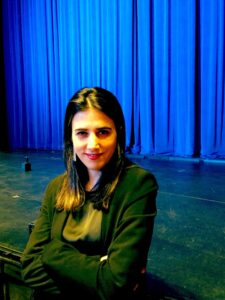International Ph.D. student Elena Peña-Argüeso (’19 MA) completed her undergraduate studies in English literature at the University of Sevilla and found a pathway to pursue graduate studies at the University of North Carolina at Chapel Hill through an exchange program.

“I thought—wow—this would be perfect for me,” Peña-Argüeso said. “I want to do a Ph.D., I love doing research, and I also love teaching.” The connection of teaching and research, key components of the University’s mission, attracted her to the Department of Romance Studies where she’s specializing in Spanish literature.
“I don’t see the results of the research that quickly,” Peña-Argüeso said. “But with teaching, I do. I really like that every class is different; every group of students is a different experience.”
As a graduate student, Peña-Argüeso is diving into 17th-century Spanish literature. At the time, the Netherlands were under Spanish rule. People in the Netherlands began to practice Protestantism as part of religious reformation, instead of Catholicism, which created tension between the two nations.
“It was very interesting to find that in Spain, there is a connection with the Anglo-Saxon world and with Protestantism,” she said.
The Netherland’s diversion from mainstream Catholicism set the stage for the future of nations across Europe, as religion played a key role in developing national identities. Literature from theatrical productions, Peña-Argüeso argues, were the most influential tools of the time to sway public opinion about nation building.
“Very few people could read or learn from politicians,” Peña-Argüeso said. “The theater is different: It went down to the streets. People knew what was going on in other parts of Europe because of the theater.”
Peña-Argüeso spent her summer studying value of theatrical works and pamphlets, which were often distributed at the theater. The effects of these pamphlets served as a foundation of national and cultural identities, with an influence that reaches to the 21st century.
For Peña-Argüeso, who calls Sevilla, Spain her home, The Fran and Paul Hoch Summer Research Fellowship allowed her to focus on her research so she could return to teaching with a renewed appreciation for her area of study: the theater and its messaging.
“This summer, I can focus on that,” she said. “I could access the documents I needed, and I went to the libraries.” Peña-Argüeso also finished an article that she hopes to publish soon, all in an effort to build her portfolio as she begins her search for a tenure-track teaching position. “I find the teaching really rewarding,” she said.
The Summer Research Fellowships provide summer support to doctoral students so they may focus exclusively on their dissertation research.
